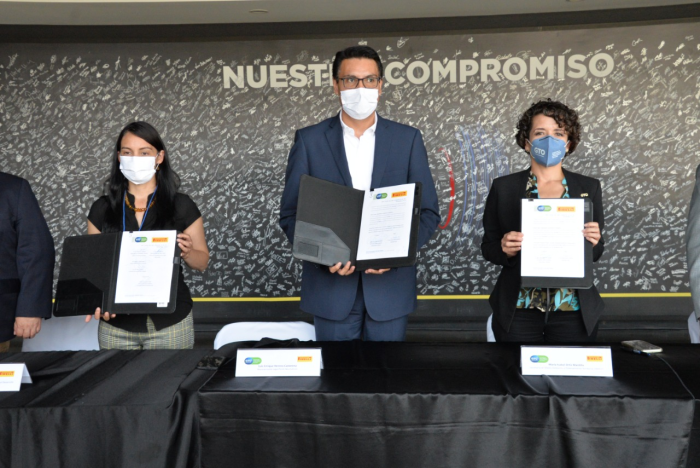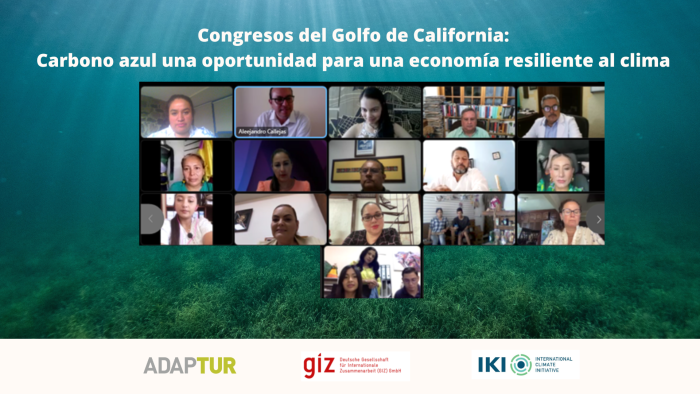International cooperation is key to achieving the climate goals of the Paris Agreement and the 2030 Agenda. With the aim of strengthening dialogue and the exchange of good experiences between projects of the International Climate Initiative in Mexico (IKI), the sixth IKI project exchange workshop in Mexico was held on May 19, 2022. Eighty six people participated in the event, from public and social sectors.
The high-level event had the outstanding presence of the Ministry of Environment and Natural Resources (SEMARNAT), the Ministry of Agrarian, Territorial and Urban Development (SEDATU), the Ministry of Agriculture and Rural Development (AGRICULTURA), the Ministry of Treasury and Public Credit (SHCP), the Secretary of the Environment and Territorial Planning of Guanajuato (SMAOT), as well as representatives from the Ministry for the Environment, Nature Conservation, Nuclear Safety and Consumer Protection (BMUV), the German Federal Ministry for Economic Affairs and Climate Action (BMWK) and the German Embassy.
https://twitter.com/GIZMexico/status/1527324256996327424?s=20&t=9AEXAM4NMnXuAi8HCV4S8A
During the opening remarks, SEMARNAT and the German Embassy reiterated their common interest in cooperating within the IKI framework for the protection of the environment, the fight against climate change and the protection of biological diversity. On behalf of the BMWK and BMUV of the German Government, they reaffirmed the priority that climate change represents for the government and the importance of IKI cooperation in Mexico since 2008, in addition to mentioning the priorities of the biodiversity agenda within the Global Biodiversity Framework.
Mexican climate policy
Subsequently, representatives of the Mexican government presented the strategies and priorities of Mexico’s climate and biodiversity policy. On behalf of SEMARNAT, the General Directorate of Policies for Climate Change announced the climatic risks that are already being experienced in Mexico. In addition, he shared various actions that the Mexican government is carrying out to adapt to climate change. He agreed with the German government in putting climate justice at the forefront.
Additionally, various priorities of the climate change agenda were shared by SEDATU and AGRICULTURA, including the cross-cutting link between climate change, territorial planning and the agricultural sector.
Implementation of climate action in the transport sector
The first part of the event concluded with a panel on sustainable transport, the actions that are being developed, the challenges and opportunities to build cities and a prosperous, green and inclusive transport sector.
The panel was integrated by Francisco Ramírez, General Coordinator of Strategic Projects and Alternatives against Climate Change of the National Institute of Ecology and Climate Change (INECC); David Camacho, Director of the Railway Transport Regulatory Agency (ARTF); Roxana Montealegre, Director of Mobility of SEDATU; María Isabel Ortiz Mantilla, head of the SMAOT and President of the General Assembly of the National Association of State Environmental Authorities (ANAAE); and Verena Ommer from the International Climate Initiative Division of the BMWK.
In general, the panel agreed on focusing on sustainable transport, prioritising public transport, electromobility, urban efficiency and thinking about sustainable cities. The importance of working on decarbonisation routes in the transport sector and linking it to planning, public policy and land use planning instruments was emphasised. Additionally, the potential of the railway sector to achieve these purposes was commented, based on the fact that we have a network of more than 23 thousand kilometres that unite the cities of the country.
Exchange between IKI projects
There are 32 IKI projects operating in Mexico, with 21 implementing organisations and 31 implementing counterparts; bilateral projects have a budget of more than 29 million euros. In addition, new IKI projects starting in 2022 were presented, such as the Latin American Climate Asset Disclosure Initiative (LACADI); Transformative Urban Coalitions, Territorial Planning and Financial Innovation to increase Mexico’s resilience to climate change (SAbERES); CitiesAdapt – strengthening adaptation to climate change in cities; and the expansion of climate finance through the financial sector – “30 by 30 Zero”.
The participants carried out an exchange in thematic groups with the aim of identifying future synergies and the need for successful knowledge management within the IKI. They were divided into five thematic groups: cities, biodiversity, energy efficiency, climate commitments and green financing.
As a result of the working groups, there were several convergences in each area. Regarding best practices, the projects highlighted the integration of climate change and biodiversity criteria in cost-benefit analysis and projects from various sectors, as well as intersectoral cooperation and cooperation with various government orders. Regarding the potential, they pointed out the strengthening of monitoring, reporting and verification (MRV) systems to have updated and systematised information. Regarding the challenges, they alluded to the articulation, coherence and continuity of the measures implemented by the projects over time and the strengthening of financing models. In terms of knowledge management, they pointed to the documentation and dissemination of lessons learned from implemented projects and the creation of a Community of Practice for the exchange of experiences at the local, national, regional and global levels, transversally.
The International Climate Initiative (IKI) is an important part of the German Government’s international commitments to support the implementation of international climate agreements and the protection of biodiversity. The Federal Ministry for Economic Affairs and Climate Action (BMWK) has been the lead agency of the IKI since 2022. The IKI collaborates with its founding department, the BMUV, and the German Federal Foreign Office.
Check out the sessions’ videos:
6th IKI Workshop: Cooperation within the IKI framework- YouTube
6th IKI Workshop: Mexican Climate Agenda – SEMARNAT – YouTube
6th IKI Workshop: Strategy and priorities of Mexico’s 2022 climate and biodiversity policy – SEDATU – YouTube
6th IKI Workshop: Strategy and priorities of Mexico’s 2022 climate and biodiversity policy – AGRICULTURA – YouTube
Past IKI Workshops in Mexico:


